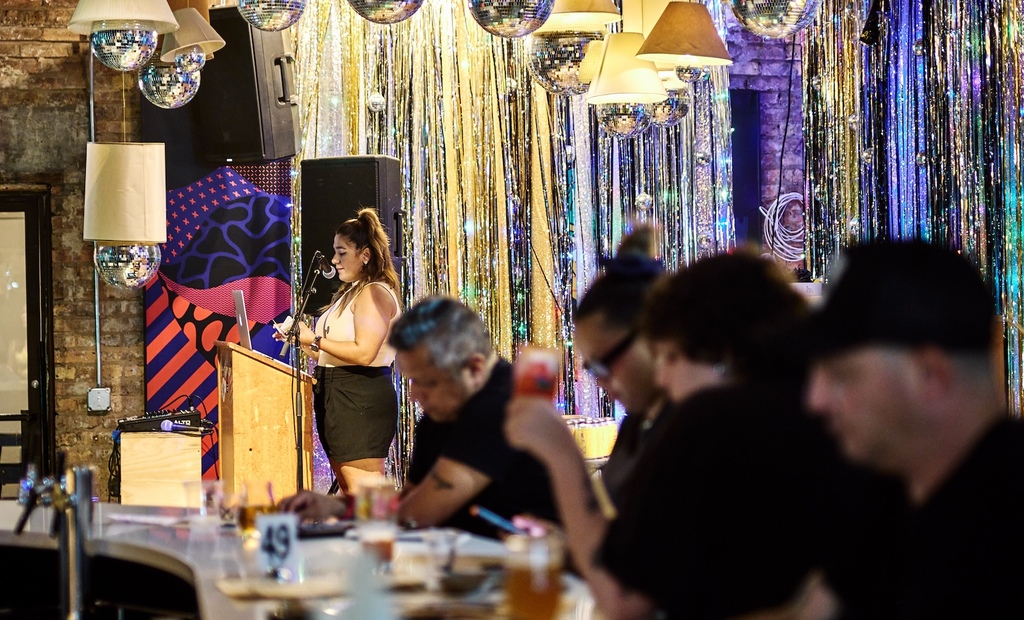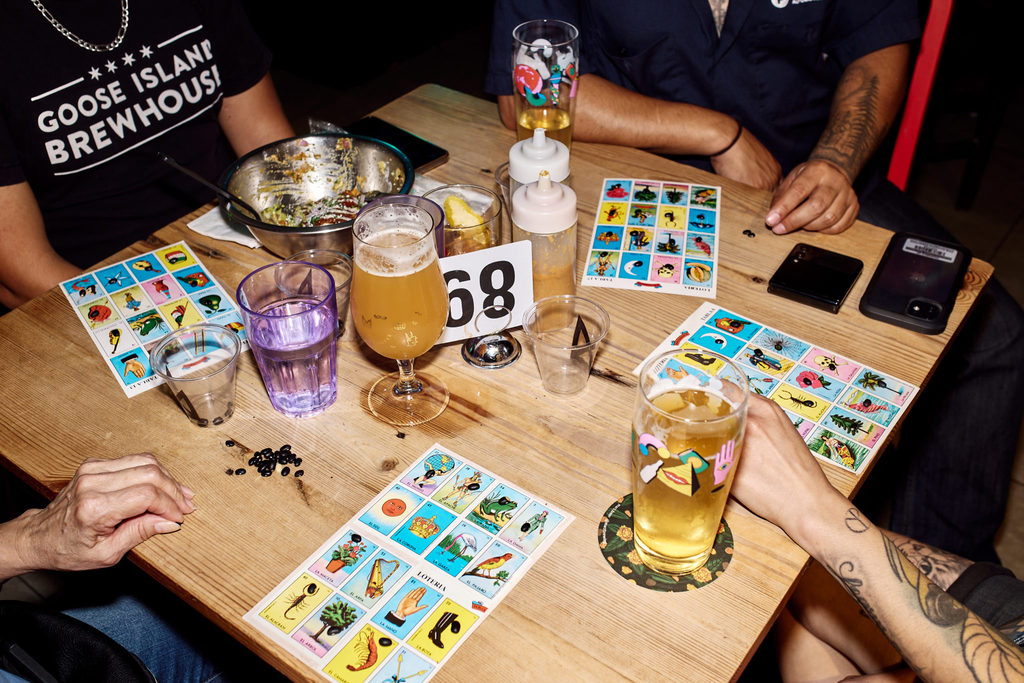As the craft beer industry continues to grow across the country, a gap still exists in the ethnic and gender diversity of those who own and work at craft breweries, as well as those who consume craft beer. According to a demographic audit conducted in 2021 by the Brewers Association, 94 percent of brewery owners were white and only three percent of breweries were solely female-owned.
However, for a local craft brewery on the south side of Chicago, community and inclusion are core values that guide the brewery’s business and operations.
Ten years after it opened, Marz Community Brewing Company has become an example of a brewery that consistently welcomes cultural diversity and celebrates the experiences of employees and beer consumers. There’s no clearer beacon for this than Xareni Barrios, the brewery’s senior sales manager.
Barrios began working for Marz as a brand representative in 2018. She recognizes her identity as a Latina woman opens up market opportunities for Marz to reach Latino businesses and consumers.
“Something that I really love that I can do is, for my stops [accounts], I can go in there and speak Spanish and we do the order in Spanish. It allows it to be a more organic relationship. They trust me,” Barrios said.
Under Barrios’ leadership, Marz’s Latino-owned accounts have more than doubled from 10 to 25. Whether it is singing Latin rock on karaoke night, playing loteria (Mexican bingo) on Tuesday nights, or eating “Chicago’s original cheese-crust taco,” Barrios and Marz consistently cultivate opportunities for Chicago’s Latinx community to enjoy Marz’s craft beverages.

Family Ties
Founded in 2013 by Ed Marszewski, Marz is located in Chicago’s McKinley Park neighborhood, which is roughly 55% Latinx, per Chicago city estimates. However, the idea of Marz was born in a neighboring community bar in the Bridgeport community called Maria’s Packaged Goods & Community Bar.
The bar was originally called Kaplans and was owned by Marszewski’s mother, Maria, before he and his brother took it over and rebranded it. The idea was to create a space that offered craft beer and cocktails in a neighborhood that did not have many of those options available, while continuing to uphold an inclusive space rooted in Maria’s traditional Korean value of respect.
“[Bridgeport] was known as an unwelcoming place to people of color,” Marszewski says. “My mother was very clear that people who came to her bar would not be insulting or disrespectful or racist to anyone in the place.”
For Marszewski, who is of Korean-Polish descent, these values of inclusivity and community that Maria’s practiced inspired the founding of Marz as a space for people of all backgrounds to come together over craft beer.
“It was through the experience of running this bar and being part of these various communities that it did not seem unusual for us to be a place where we were welcoming to everyone.”
Community Connection
Today, Marz continues the spirit of inclusivity with initiatives led by Barrios. Beyond maintaining accounts, facilitating orders and deliveries, and coordinating donations, she also works on programming and establishing collaborative partnerships with local small Latinx businesses. One such partnership was called Big Meech, a michelada collaboration. (A michelda is a Mexican drink traditionally made with beer, lime, and spices that is often mixed with tomato juice.)
This michelada partnership included Marz, locally sourced michelada mix produced by Big Mich, and Mexican lager from Barra Brava, a Latino-owned nanobrewery run by the head brewers at Marz. If a customer orders a Big Meech at Marz’s taproom, the michelada can also come with chamoy, a Mexican spiced sauce made with pickled fruit, on the rim of the beer glass for additional sweet and spicy flavors with every sip. The chamoy, too, is made locally by Barrios’ friend Rosy Ahedo .
Barrios credits the culturally informed outreach and programming to the increase in Latinx customers at Marz.
“Creating partnerships with Latino-owned businesses and having them come to Marz and be here has helped a lot,” she says. “When I first started here, it was definitely a way more white-centric customer base, but I have seen a super huge increase in more Latinos coming here.”
Over the last few years Marz has opened up its space to several Latino-owned businesses, while also introducing Latino-inspired food and beverages to customers of all backgrounds. In several ways, Marz is a local incubator. Chefs are constantly invited to do pop-ups at Marz. The brewery regularly seeks out other brands, or people interested in opening up a restaurant or brewery.
Barra Brava Brewing Company is an incubator recipient: The two brewers are brothers of Mexican descent who have dreams of launching their own brand focused around their passion for the game of soccer. Marz offers its space and brewing equipment for the brothers to brew Barra Brava beers, and also offers these beers in the Marz taproom.
The taproom is also home to Taco Sublime, a Latino-owned restaurant. It originally operated out of a food truck, but after a fire damaged the truck, Taco Sublime was left without a kitchen. Since then, Marz has offered their kitchen space for the restaurant to continue operating over the last couple of years.
Claudia Llamas recently discovered Marz. She stopped by Marz on a Tuesday night after seeing Marz advertise its loteria night. However, she was initially drawn to Marz because of their food.
“I fell in love with Marz right away. I come here for their pop-up restaurants… I like that they change their menus. I also love micheladas and I like Big Mich,” she says.
Llamas enjoys the variety of Latinx-inspired beer options and collaborations at Marz. As a craft beer drinker and South Side resident of Chicago, Llamas recognizes the cultural focus Marz’s beer, food, and programming is rare in her community and in the industry.
“I think Marz is pretty cool because you really do not see it. I think this is one of the only breweries that has Mexican lagers and micheladas,” Llamas says.

Workplace Culture
The consistent and curated programming by the staff at Marz, which is about 50 percent Latino, is thoughtfully and authentically connecting with people of all backgrounds. It can range from partnering to create unique beverage options one week, to organizing coat drives for newly arrived asylum seekers the next week. The staff is empowered to create and lead initiatives that they are passionate about, while being given the opportunity to grow within the company.
“When I first came here, I never felt like they used my identity as a woman or my identity as a Latina against me or in favor of me. It was about the job. I never felt like I was not able to do something. I never felt like they were looking over my shoulder waiting for me to mess up or something. They gave me the space to grow into the position I am in now,” Barrios says.
Barrios’ rise to sales manager is a reflection of how Marz operates, regularly giving staff opportunities to take on new roles or responsibilities.
“We just want people to learn new skills and do what they want to do within the confines of what we are capable of doing at the brewery,” Marszewski says “I don’t think Xareni had any sales experience, but she wanted to try and we encouraged her… She learned how to do it on her own and she kicks ass.”
At Marz, staff is encouraged to share ideas for events or programming. “If people are interested in doing a thing, we try it out. We are very open to our coworkers or colleagues to come up with a concept and let them run with that if they are really into it. We allow room for failure,” Marszewski says.
For Marszewski, there is not a secret formula to curate programs or beverages that connect with a diverse consumer base. Empowering Latinx staff, like Barrios, to lead the development of authentic partnerships and programming that connect with Chicago’s Latinx community, has resulted in an increase of Latinx clientele and better brand recognition among this demographic. For breweries interested in diversifying their consumer base, Marszewski says, “just be curious about other cultures, other cuisine, other other things that are happening around you… just be real, be curious and be interested in what happens around you and share that with your customers.”


